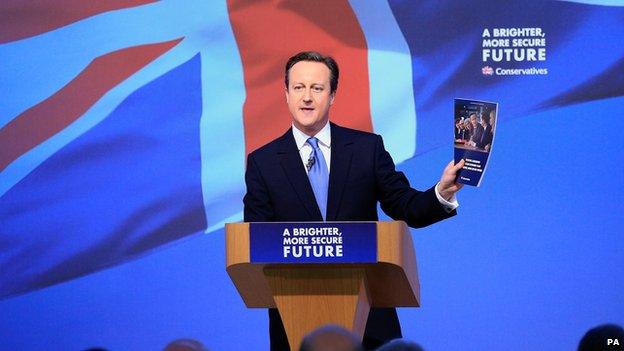How the Lords could cause trouble for David Cameron
- Published
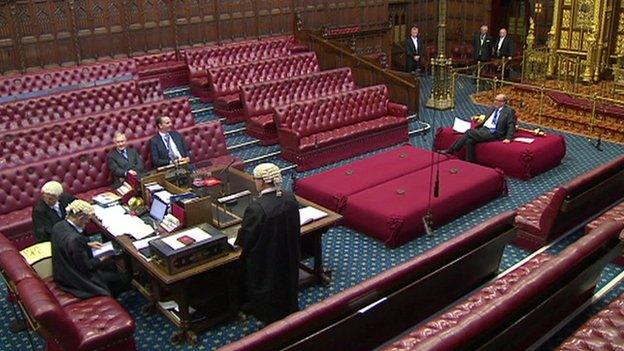
The Conservatives do not have a majority in the House of Lords
When David Cameron heads to the House of Lords for the Queen's Speech later this month he might want to cast his eye along the red benches.
Sitting there will be scores of peers who - when the ermine robes are off and Parliament gets back to business - could start causing a bit of trouble for the government.
Managing Mr Cameron's small majority in the Commons - 12 MPs - is going to require some skill from the party whips. But it could turn out to be an easy day at the office compared with handling the complicated mechanics of the Lords where the Conservatives aren't even close to a majority.
The numbers - see below - don't add up for the prime minister in the "upper chamber".
Conservatives - 224
Labour - 214
Crossbencher - 178
Liberal Democrats - 101
Bishops - 26
DUP - 3
Other - 33
Together, Labour and the Lib Dems have 315 peers - enough to beat the Conservatives by 91 votes. Then there are the crossbench - or independent - peers to think about.
They're hard to predict as they don't vote as a block. In the worst-case scenario for the Conservatives, their 224 peers are up against a whopping 555 from other parties and groups. On the other hand the crossbenchers could, in theory, help the Conservatives win.
Weak position
As Professor Meg Russell, Director of the Constitution Unit, external at University College London, notes: "The Conservatives are in a relatively weak position in the Lords, holding less than a third of seats. The government can readily be defeated by various combinations of other forces."
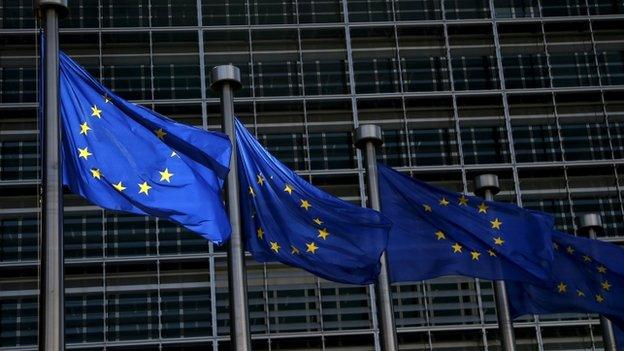
There could be some lively debates on an EU referendum
Policies that could stir up objections in the Lords include abolishing the Human Rights Act and legislation paving the way for an EU referendum.
It's very unusual for peers to vote against an entire Bill. Their style is to go through legislation amending bits they don't like. The government can either accept the changes or overturn them in the Commons.
Maybe David Cameron will start wishing he'd pushed on with plans, three years ago, to introduce elected peers. He abandoned the proposals in the face of opposition from Conservative MPs and peers. It was another reprieve for the House of Lords, which has survived numerous attempts at reform over the last 100 years.
And there won't be another existential crisis for the time being. The Conservative election manifesto states that they see a "strong case" for introducing an "elected element" but "it isn't a priority in the next Parliament".
Interesting times
With wounds to lick and new leaders to choose, Lib Dem and Labour strategists aren't thinking too deeply about their tactics in the Lords. But as politicians drift back to Westminster the possibilities are starting to bleep on the political radar.
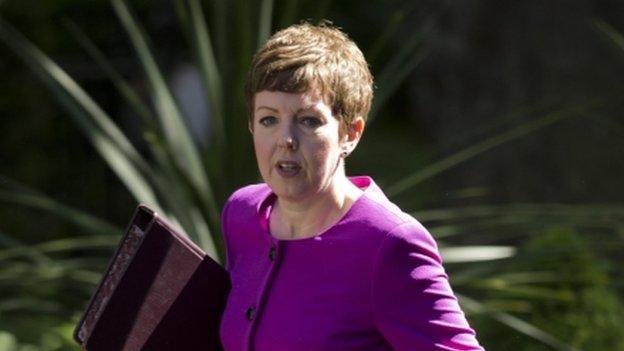
Baroness Stowell has got a "difficult job"
Labour peer Lord Foulkes has already been tweeting about what he calls the "difficult job" facing the Leader of the Lords, Baroness Stowell, whose task is to get government business through.
He predicts "interesting times", saying: "Labour and the Liberal Democrats have a huge majority over the Conservatives. The crossbenchers are unpredictable but on a number of occasions they have come with us. The Lib Dems in the Lords are old-fashioned Lib Dems. They'll be happier working with us than the Tories."
'Off the leash'
The Liberal Democrats are leading lights in the campaign to turn the House of Lords into an elected chamber. It's a cruel irony that with only eight MPs, the Lib Dems will be relying on an institution they dislike to give them a solid platform at Westminster.
How will they get along with their former coalition partners though? The Lib Dem peer, Baroness Hussein-Ece, said the Conservatives were now "off the leash" but wouldn't be getting "an easy ride".
"The dynamics are going to be completely different. We will take things on a policy-by-policy basis. I feel quite passionately about keeping the Human Rights Act and I'm pretty sure that my colleagues will be opposing abolition vociferousIy."
But David Cameron can take some comfort from the fact that the Lib Dems will not be falling into Labour's arms.
Baroness Hussein-Ece is certain there will be issues the two parties can agree on but is equally sure they will not form a happy union as a matter of course.
Tribal politics
She said: "I'm afraid that the Labour Party is more interested in tribal politics. It could have conducted itself in a more progressive way during the election."
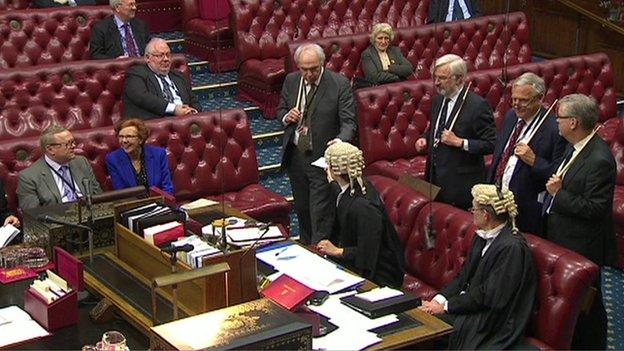
A defeat for the coalition on visa laws last February
In the last Parliament, the coalition government was defeated 103 times in the Lords and a Labour source in the Lords predicts that the Conservatives will "want to make up for lost time".
He said: "What we anticipate is that they will start to look back at the concessions they made and the opposition amendments that got through."
And the feeling is that the government will find ways to use secondary legislation - which empowers ministers to adjust some laws.
By convention, the House of Lords is reluctant to challenge policies promised in election manifestos and doesn't vote against measures on taxation and spending. But Professor Russell thinks the rules around those conventions are "far from clear" and that Labour and the Lib Dems might be tempted to block what they see as Conservative "austerity" measures.
Meg Russell says: "The House of Lords is a complicated place. Historically at least, they have always been very sensitive to public opinion. They are not likely to go in all guns blazing."
How can David Cameron deal with trouble in the Lords - even if it is well-meaning and principled?
He can't get rid of any peers but he could, in theory, create a huge number of new Conservative peers to give him a stronger base.
'Outcry'
"There are no rules," Meg Russell adds of the possibility. "The prime minister has complete patronage. But of course it wouldn't go down well with the public and there would be an outcry in Parliament."
And introducing too many new peers would also be embarrassing because the Conservatives have promised to tackle the size of the chamber. With 779 active members, it's one of the largest in the world.
The Conservative Lord Cormack thinks that the prime minister shouldn't worry too much because he can rely on the Lords to behave "with a considerable degree of sense".
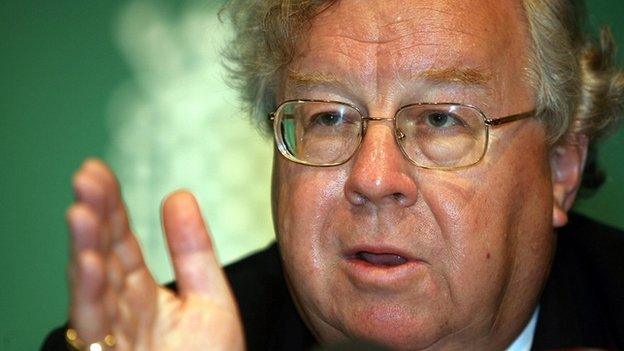
Lord Cormack doesn't anticipate any unpleasantness
"There will be stormy patches and it's always over the things that you don't predict," he says. "But the important thing to do is play to the strengths of the Lords. There's an enormous accumulation of wisdom and experience. It generally improves bills."
He is relaxed about the next few years. "I don't anticipate any unpleasantness. For the government to be defeated in the House of Lords isn't the end of the world." And that's because, he said, the Lords believes in the supremacy of the Commons.
Missing a trick?
It may be a while before the new dynamics in the Lords play out. The first bills will be unveiled in the Queen's Speech on 27th May and any controversial ones may not reach the House of Lords until after the summer break.
But there's one other constitutional niggle to mention. In theory, all parties should be represented in the House of Lords - even the small ones. The Greens have one peer and UKIP has three.
But there are no members of the SNP in the House of Lords. And with 56 MPs, it means the Lords isn't speaking for millions of people in Scotland. The SNP is adamant, though, that it doesn't want anything to do with the place.
With the Lords potentially a powerful force, are the Scottish Nationalists missing a trick?
Not according to the SNP MP Pete Wishart who declared: "It's an affront to democracy. We will have nothing to do with this democratic outrage. The House of Lords doesn't need reform. We need to abolish it and start again."
- Published14 May 2015
- Published11 May 2015
